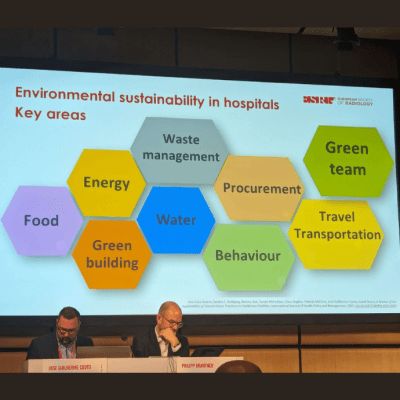It started with sea anemones at a college lab. As an undergrad in Swarthmore College’s marine biology program, Farah Hussain, MD, used the organisms to study coral bleaching, where a coral turns white from stressors like high temperature or pollution—a tell-tale sign of climate change. That’s when her interest in environmental advocacy began.
Hussain ultimately decided to pursue medicine after earning her bachelor’s in biology in 2009, putting her interest in marine life on hold. But all those sea anemone studies came flooding back in 2018, when Hussain, who is now an associate professor of Clinical Medicine (Hospital Medicine) at the Perelman School of Medicine (PSOM), saw a report from the Intergovernmental Panel on Climate Change.
“It described how climate change is a threat to human health and livelihood,” Hussain said. “That’s when this seed was planted. I thought that maybe there was an opportunity for me to connect my interests in the environment and conservation with my work in medicine.”
To prepare future generations of physicians for this global crisis, Hussain, in collaboration with medical school faculty and staff, helped launch the Planetary Health curriculum in 2022, with Hussain as the program’s inaugural director.
Planet health = human health
Planetary health has become an emerging field and area of research that has garnered “a very quickly growing interest” among medical schools, Hussain said. Penn Medicine is not alone in this trend, as both Harvard Medical School and Stanford University School of Medicine offer analogous curricula or positions like Hussain’s.
The planetary health material is integrated into PSOM’s existing courses, centered on basic science and organ systems, through lectures, slides in course presentations, or supplemental materials in the syllabus for self-directed learning.
Prior to this formalized curriculum, PSOM offered occasional lectures on planetary health, along with the Climate Change and Health elective, which is still currently led by Hussain, for students interested in learning more about the environment’s impact on patient care and the disproportionate effects on disadvantaged communities. During this elective, students are introduced to topics such as mortality related to extreme weather; changes in infectious diseases due to a changing climate; and how particle pollution can affect cardiopulmonary morbidity and mortality.
“The health of the planet is directly related to human health,” said Hussain. “The consequences of climate change are going to be at the forefront of some of the challenges students will face in their careers.”
Collaboration is key to curriculum…and combatting climate change
PSOM students, from left to right, Catherine Shen, Elizabeth Whidden, Phoebe Cunningham, Jess Campanile, Sarah Wornow, Isha Thapar, and Jonathan Szeto.
Hussain meets with PSOM’s course directors to brainstorm ways that climate-related material can be integrated into the current catalog of classroom courses that students take in their first year and a half of medical school.
The Psychiatry course Brain and Behavior touches on the mental health implications of climate change, such as PTSD and depression. A lecture titled “Environmental and occupational lung diseases” in the Pulmonology course informs students about how pollution, or extreme events like wildfires, can cause worsening exacerbations for patients who have asthma and chronic obstructive pulmonary disease (COPD).
Hussain also lectures in the Health Systems Sciences course about health care’s direct impact on the environment. “The health care sector itself is contributing to the problem,” she said. “It’s a cycle of hospitals releasing greenhouse gas emissions, which affects our communities and our patients.” Penn Medicine is tackling this issue with an institutional commitment to become the most environmentally friendly health care system in the country, with many of its facilities earning Leadership in Energy and Environmental Design (LEED) health care certifications, along with implementing a slew of sustainability projects that are being led by both faculty and students.
One of these projects, which involves transforming operating rooms into greener spaces—reducing medical waste and chemical solvents—is supported by PSOM’s student-led Healthcare Sustainability Group. The goal of the group, composed of a board of medical students and student subcommittees, is to extend education about connections between climate and health beyond the classroom. Each board member helps advance student-driven initiatives—like the Planetary Health Report Card, a nationally-known metric tool to evaluate and improve planetary health programming in medical education—and assists with an ongoing physician-led project within the health system to contribute ideas and further this work.
“We’re fixing this paradox of physicians trying to ‘do no harm,’ yet also being part of the health care industry, which is a primary contributor to global warming,” said Sarah Wornow, a first-year medical student and Healthcare Sustainability Group board member. Wornow has experienced the effects of climate change first-hand. Growing up in California, she recalled days her school would close due to unhealthy air from wildfire smoke. “Climate change is an issue that everyone should care about,” she said, “but as future physicians, we have an obligation to our patients to help shape and improve the environment we want to live in.”
From the classroom to clerkships
Currently, the planetary health material is designed for classroom-based learning, for the pre-clerkship years. Hussain hopes to expand the curriculum to clinical rotations, where students can apply these practices into their own care, such as engaging with patients about the environment’s impact on their health and connecting them to community resources, and advocating for their patients disproportionately affected by climate change.
“There’s amazing work going on right now, not just through educational initiatives at PSOM, but throughout our hospitals to implement sustainable practices,” Hussain said. “It’s such a critical issue that we’re all working together on, and I’m grateful to play a part in addressing it.”

Farah N. Hussain, MD
Hospital Medicine
- Associate Professor of Clinical Medicine (Hospital Medicine)
Source & Image Credit: Penn Medicine
















